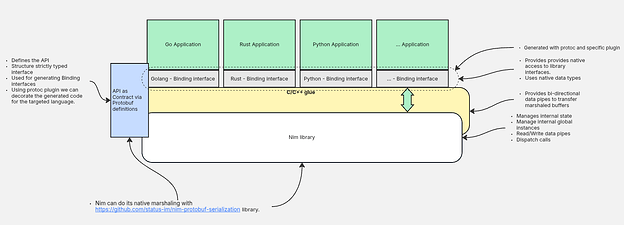Targeted benefits
- Make a clear API as a contract defined by data.
- Write API once in nim
- Define data as protobuf definition
- Generate in many target languages.
- Eliminate C-ABI.
- Each targeted language uses its types.
- Slim the C/C++ glue between Nim library and host language.
- Lower maintenance costs, faster support.
Problem statement
Currently, our libwaku is well defined and mature. However, due to Nim’s own memory management and garbage collection mechanism, the library code must run in its own thread.
This implies that API calls must be transferred to the nim thread before processing, while returning of data shall happen in callbacks - those actually to be processed on Nim’s thread.
For simplicity, we currently use json textual representation to transfer data back to the caller.
When defining a new library interface, the process involves a lot of manual work, it needs to use C-types for data exchange, both on the target language and the Nim library side.
Proposal
Having protobuf as a common language glue between Nim library and basically any kind of target language comes with several benefits.
- Protobuf data definition stands for API contract that our library offers.
- Allow to use target language’s own data types.
- Glue code can be generated.
- Encoded buffer can be easily transferred between threads without manual handcrafting code.
Ideal solution
The ideal solution shall:
- Generate as much code as possible from protobuf definitions
- This can be achieved by protoc code generator plugin
- C/C++ glue shall be library and API agnostic
- Write once and used for many Nim libs
- With bi-directional data pipes between the user and a Nim library, we can detach application processing from Nim processing.
- Synchronous or asynchronous modes can be supported.
